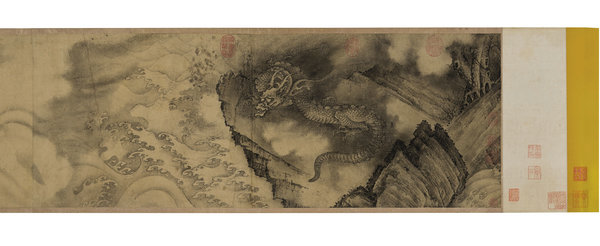 |
|
Part of Six Dragons, a painting that once belonged to Emperor Qianlong. [Photo provided to China Daily] |
Ji Tao, an art market observer in Beijing, said Chen preferred to paint after he got slightly drunk. "He splashed extensive ink to portray seas, clouds and strange rocks by which he highlighted the strong motion and volume of dragons, and therefore he conveyed a mystical feeling."
Chen's dragon paintings also reveal his political views and ambition, Ji said.
Twenty-two paintings signed by Chen Rong are found in museums and private collections worldwide, and 11 of them are in the United States and Japan, according to Zhu Wanzhang, a researcher at the National Museum of China.
Beijing's Palace Museum houses two of Chen's calligraphy pieces.
The painting is cataloged in Shiqu Baoji, a prominent inventory of top-notch Chinese paintings and calligraphic works in the imperial Qing collection. It was among a large number of Chinese works of art that were sold by aristocrats following the collapse of the Qing Dynasty.